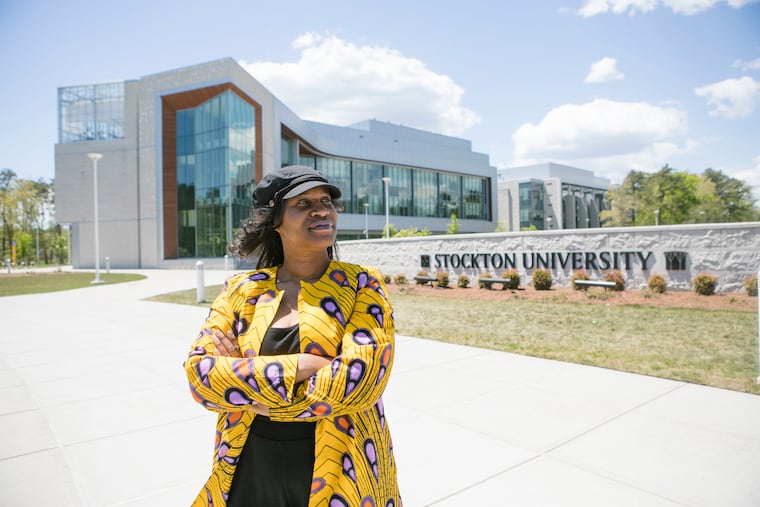Stockton University is requiring incoming students to take courses on race. Will other colleges follow?
Stockton University plans to tackle a tough topic with incoming students who will be required to take at least two courses on race and racism.

Beginning this fall, incoming students at Stockton University will have two new additions to their required course study: classes on race and racism.
The South Jersey university this month became one of the few colleges in the region to adopt such a mandate, as more colleges, universities, and public schools try to figure out how to teach about race. Students have staged protests demanding more cultural offerings, and faculty on some campuses have also led the charge.
» READ MORE: At Penn State and other campuses, Black studies professors and students lead the call for change
Donnetrice Allison, coordinator of the Africana Studies program at Stockton and professor of Africana Studies and Communication Studies, proposed the mandatory courses. A resolution unanimously approved by the trustee board means that all undergraduates, regardless of major, must study the history and impact of race and racism in America.
“The only way we are ever going to deal with these issues is if people are educated about them,” said Allison, a Stockton professor for 16 years. “We haven’t been honest with our issues about race.”
Stockton offers about 25 courses, such as “Race, Class, Gender and Criminal Justice,” that meet the new requirement and more will be added, Allison said. About 20 faculty members will undergo training this summer to learn how to teach about race, she said.
In addition, faculty are being encouraged to incorporate discussions about race and racism in every discipline, not just criminal justice, Allison said. For example, in a literature class, students could examine how Black characters have been portrayed, she said.
“One course alone will not be effective,” Allison said. “If we are ever to address the racial issues this country continues to grapple with, students need to understand that there are levels to racism and that to some degree it is within every field of study.”
Located in Galloway Township in Atlantic County, Stockton enrolls nearly 9,000 undergraduates. About 63% are white, 16% Hispanic, 9% Black, 7% Asian, and the remainder are multiracial. Stockton has offered Africana Studies as a minor since 1983 and added it as a major in 2019.
“It’s an amazing opportunity for students who think they know a little but don’t know how to navigate conversations,” said Morgan Rush, 25, of Sicklerville, who is white and became Stockton’s first Africana Studies graduate last week. “You may be around people who are different from you and that’s OK.”
Stockton began working on the mandatory race course requirement several years ago. Similar movements on other campuses gained momentum in the wake of George Floyd’s killing by a white police officer in 2020 that prompted demands for changes.
“It’s been a long time coming,” said Patricia Reid-Merritt, an author, social worker, and professor who has taught a race course at Stockton for 45 years. ”It is a step forward, but there is so much work that needs to be done.”
Cynthia Young, head of the African American Studies department at Pennsylvania State University, believes the mandatory race courses are a step in the right direction. She has called for Penn State to require all students to take a course in anti-Black racism.
“There’s nothing wrong with saying that students need to be conversant in the impact of racism,” said Young, an associate professor of African American studies and English at the University Park campus where Black students make up about 4% of the student population. “These problems persist.”
Penn State created a Select Presidential Commission on Racism, Bias, and Community Safety and supports the request for required racism and bias coursework for all students, said spokesperson Lisa M. Powers. A subcommittee is with the Faculty Senate, which oversees curriculum, she said.
Over the next 18 months, the 14-university Pennsylvania State System of Higher Education plans to set up a strategy for more diversity in its curriculum, Denise Pearson, vice chancellor for diversity, equity, and inclusion, said in a statement. It is conducting an inventory of race and racism courses offered or required across the universities, she said.
At Temple University, where about 13% of undergraduates are Black, there has been “a race and diversity element” as a required course since 1992, said spokesperson Ray Betzner. Will Jordan, an associate professor of Urban Education who teaches about race in graduate courses, would like to see Temple follow Stockton’s lead.
“Whether they pay attention and get good grades — that’s a different story,” Jordan said with a chuckle. “They can’t say no one ever told them.”
» READ MORE: Black Lives Matter Movement goes to school to teach students about social justice
Elsewhere in the region, Rowan University offers a Black Lives Matter course every fall as an elective, said Alicia S. Monroe, an adjunct professor. It began several years ago with a handful of students and now draws more than two dozen students, she said. The class focuses on what can be done “to move the needle to address systemic and institutional racism,” she said.
“We have conversations that are unapologetically uncomfortable,” Monroe said. “It’s the time.”